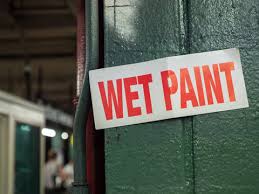
In Hegel’s “Phenomenology of Spirit,” he mentions the concept of sense-certainty, delving into the depth of the “now” and the “here.” He then explains that it is an inadequate concept in reality because the “now” and the “here” are constantly changing. When one says they are doing something in the immediate “now,” it is already in the past after that individual finishes saying the word “now.” An example illustrating this fallacy is the presence of wet paint signs in our subway system. When personally traveling underground in New York City, and encountering a wet paint sign taped to subway beams, countless individuals would avoid even bracing on the beam in fear that there is wet paint. However, when directly placing a finger on the beam, one hundred percent of the time, the paint would be dry, revealing the limitations of relying solely on sense-certainty. Hegel explains this perfectly by stating, “This itself. To the question: ‘What is the Now?’ we answer, for example, ‘The ‘now’ is the night.’ To put the truth of this sensuous-certainty to the test, a simple experiment will suffice. We write down this truth. A truth cannot be lost by being written down any more than it can be lost by our preserving it, and if now, this midday, we look at this truth that has been written down, we will have to say that it has become rather stale.” In other words, he is explaining that when it is night if it were to be the morning or a different time of day and look back at the phrase “The ‘now’ is the night,” that phrase would be false because it would be a different time of day, which is not the “night.” The same applies to the wet paint scenario. Is the paint really wet when it’s already dry? Hegel does a good job clarifying this fallacy with the now and here.

